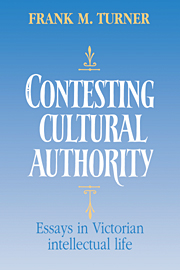Book contents
- Frontmatter
- Contents
- Preface
- I SHIFTING BOUNDARIES
- II SCIENCE AND THE WIDER CULTURE
- 5 Victorian scientific naturalism and Thomas Carlyle
- 6 Rainfall, plagues, and the Prince of Wales
- 7 The Victorian conflict between science and religion: a professional dimension
- 8 Public science in Britain: 1880–1919
- III MODERNS AND ANCIENTS
- Index
5 - Victorian scientific naturalism and Thomas Carlyle
Published online by Cambridge University Press: 22 September 2009
- Frontmatter
- Contents
- Preface
- I SHIFTING BOUNDARIES
- II SCIENCE AND THE WIDER CULTURE
- 5 Victorian scientific naturalism and Thomas Carlyle
- 6 Rainfall, plagues, and the Prince of Wales
- 7 The Victorian conflict between science and religion: a professional dimension
- 8 Public science in Britain: 1880–1919
- III MODERNS AND ANCIENTS
- Index
Summary
During the second half of the nineteenth century the spokesmen for scientific naturalism constituted one of the most vocal and visible groups on the Victorian intellectual landscape. Combining research, polemic wit, and literary eloquence, they defended and propagated a scientific world view based on atomism, conservation of energy, and evolution. They raised the banner of the functional expertise of the scientifically educated against the resistance of religious orthodoxy, received opinion, and intellectual obscurantism. They sought to create a largely secular climate of opinion no longer dominated by religion that would permit the theories and practitioners of modern science to penetrate the institutions of education, industry, and government for the material progress and social amelioration of the nation.
Their immense energy and the multiplicity of their interests and contacts permitted them to carry their message of the benefits of scientific endeavour to audiences ranging from skilled mechanics to members of the aristocracy. Thomas Henry Huxley, whose vast panoply of activities made him the most famous of the group, illustrates the multi-faceted activities of these writers. In addition to his polemical efforts on behalf of evolution, Huxley conducted private research, trained teachers at the Royal School of Mines, served as a member of the London School Board and the Devonshire commission on scientific education, advised the government on fisheries, helped to restructure the University of London, presided for a time as president of the Royal Society, wrote textbooks, and composed essays on biology, geology, epistemology, theology, and social reform.
- Type
- Chapter
- Information
- Contesting Cultural AuthorityEssays in Victorian Intellectual Life, pp. 131 - 150Publisher: Cambridge University PressPrint publication year: 1993
- 3
- Cited by

